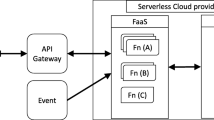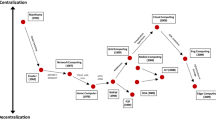Abstract
Service-oriented multi-agent systems are dynamic systems that are populated by heterogeneous agents. These agents model their functionality as services in order to allow heterogeneous agents or other entities to interact with each other in a standardized way. Furthermore, due to the large-scale and adaptative needs of the system, traditional directory facilitators or middle-agents are not suitable for the management of agent services. This article proposes the introduction of homophily in service-oriented multi-agent systems to create efficient decentralized and self-organized structures where agents have a greater probability of establishing links with similar agents than with dissimilar ones. This similarity is based on two social dimensions: the set of services that an agent provides and the organizational roles that it plays. A second contribution is an algorithm for service discovery that it is carried out taking into account the local information that is related to the homophily between agents. The experiments compare our proposal with other proposals in distributed environments. The results show that the proposed structure and algorithm offer desirable features for service discovery in decentralized environments. Specifically, these features provide short paths and a high success rate in the service discovery process and resilience under deliberate failures.
Similar content being viewed by others
References
Adamic L. A., Adar E. (2005) How to search a social network. Social Networks 27: 2005
Basters, U., & Klusch, M. (2006). Rs2d: Fast adaptive search for semantic web services in unstructured p2p networks. In: International Semantic Web Conference, Lecture Notes in Computer Science (Vol. 4273, pp. 87–100). Springer.
Bianchini D., Antonellis V. D., Melchiori M. (2009) Service-based semantic search in p2p systems. European Conference on Web Services 0: 7–16
Bisgin, H., Agarwal, N., & Xu, X. (2010). Investigating homophily in online social networks. Proceedings of the 2010 IEEE/WIC/ACM International Conference on Web Intelligence and Intelligent Agent Technology, WI-IAT ’10 (Vol. 01, pp. 533–536). IEEE Computer Society, Washington, DC.
Bisnik, N., & Abouzeid, A. (2005). Modeling and analysis of random walk search algorithms in p2p networks. Proceedings of the Second International Workshop on Hot Topics in Peer-to-Peer Systems (pp. 95–103). IEEE Computer Society.
Boccaletti S., Latora V., Moreno Y., Chavez M., Hwang D.U. (2006) Complex networks: Structure and dynamics. Physics Reports 424(4–5): 175–308
Brazier, F. M. T., Kephart, J. O., Parunak, H. V. D., & Huhns, M. N. (2009). Agents and service-oriented computing for autonomic computing: A research agenda. IEEE Internet Computing 13(3), 82–87.
Cao, J., Yao, Y., Zheng, X., & Liu, B. (2010). Semantic-based self-organizing mechanism for service registry and discovery. In: 14th International Conference on Computer Supported Cooperative Work in Design (CSCWD) (pp. 345–350).
Centola, D., Gonzalez-Avella, J.C., Eguiluz, V.M., & San Miguel, M. (2007). Homophily, cultural drift, and the co-evolution of cultural groups. Journal of Conflict Resolution, 51, 905–929.
Clip2 (2001). The gnutella protocol specification v0.4. http://www.stanford.edu/class/cs244b/-gnutella_protocol_0.4.pdf.
Crespo, A., & Garcia-Molina, H. (2002). Routing indices for peer-to-peer systems. In: ICDCS ’02: Proceedings of the 22nd International Conference on Distributed Computing Systems (ICDCS’02) (p. 23). IEEE Computer Society.
Currarini, S., & Vega-Redondo, F. (2010). Search and homophily in social networks. World 24, 1–32.
Donetti, L., & Munoz, M. A. (2004). Detecting network communities: a new systematic and efficient algorithm. Journal of Statistical Mechanics: Theory and Experiment, 10, P10012.
Dorogovtsev, S., Mendes, J. (2003). Evolution of networks. Oxford: Oxford University Press.
Ferber, J., Gutknecht, O., & Michel, F. (2003). From agents to organizations: An organizational view of multi-agent systems. In P. Giorgini, J. P. Müller & J. Odell (Eds.), Agent-oriented software engineering IV, Lecture notes in computer science, (Vol. 2935, Chap. 15, pp. 443–459). Berlin: Springer.
Fu, P., Liu, S., Yang, H., Gu, L. (2009). Matching algorithm of web services based on semantic distance. In: WISA.
Gkantsidis C., Mihail M., Saberi A. (2006) Random walks in peer-to-peer networks: Algorithms and evaluation. Performance Evaluation 63(3): 241–263
Gummadi P. K., Saroiu S., Gribble S. D. (2002) A measurement study of napster and gnutella as examples of peer-to-peer file sharing systems. SIGCOMM Computer Communication Review 32: 82–82
Huhns, M.N. (2002). Agents as web services. IEEE Internet Computing (pp. 93–95).
Huhns, M. N., Singh, M. P., Burstein, M., Decker, K., Durfee, E., Finin, T., Gasser, L., Goradia, H., Jennings, N., Lakkaraju, K., Nakashima, H., Parunak, V., Rosenschein, J. S., Ruvinsky, A., Sukthankar, G., Swarup, S., Sycara, K., Tambe, M., Wagner, T., & Zavala, L. (2005). Research directions for service-oriented multiagent systems. IEEE Internet Computing 9, 65–70 http://doi.ieeecomputersociety.org/10.1109/MIC.2005.132.
Kalogeraki, V., Gunopulos, D., & Zeinalipour-Yazti, D. (2002). A local search mechanism for peer-to-peer networks. In: CIKM ’02: Proceedings of the eleventh international conference on Information and knowledge management (pp. 300–307). New York: ACM.
Kleinberg, J. (2006). Complex networks and decentralized search algorithms. In: In Proceedings of the International Congress of Mathematicians (ICM).
Kleinberg J. M. (2000) Navigation in a small world. Nature 406: 845
Klusch, M., Fries, B., & Sycara, K. (2006). Automated semantic web service discovery with owls-mx. In: Proceedings of the fifth international joint conference on Autonomous agents and multiagent systems, AAMAS ’06 (pp. 915–922). New York: ACM.
Klusch, M., Fries, B., & Sycara, K. (2009). Owls-mx: A hybrid semantic web service matchmaker for owl-s services. Web Semantics Science Services and Agents on the World Wide Web 7(2), 121–133 http://linkinghub.elsevier.com/retrieve/pii/S1570826808000838.
Latapy M. (2008) Main-memory triangle computations for very large (sparse (power-law)) graphs. Theoretical Computer Science 407: 458–473
Lazarsfeld, P. (1954). Friendship as a social process: A substantive and methodological analysis. In M. T. Berger, T. Abel & C. H. Page (Eds.) Freedom and control in modern society (pp. 326). New York: Van Nostrand and Company.
Lopes A. L., Botelho L. M. (2008) Improving multi-agent based resource coordination in peer-to-peer networks. Journal of Networks 3: 38–47
Lv, Q., Cao, P., Cohen, E., Li, K., & Shenker, S. (2002). Search and replication in unstructured peer-to-peer networks. In: Proceedings of the 16th international conference on Supercomputing, ICS ’02 (pp. 84–95). New York: ACM.
Maymounkov, P., & Mazieres, D. (2002). Kademlia: A peer-to-peer information system based on the xor metric. In: Proceedings of the 1st International Workshop on Peer-to Peer Systems (IPTPS02).
McPherson, M., Smith-Lovin, L., Cook, J. (2001). Birds of a feather: Homophily in social networks. Annual Review of Sociology, 27, 415–444.
Michlmayr, E. (2006). Ant algorithms for search in unstructured peer-to-peer networks. In: 22nd International Conference on Data Engineering (ICDE).
Newman, M. E. J. (2002). Assortative mixing in networks. Physical Review Letters 89, 208,701.
Ogston, E., & Vassiliadis, S. (2001). Matchmaking among minimal agents without a facilitator. In: Proceedings of the 5th International Conference on Autonomous Agents (pp. 608–615).
Ouksel, A., Babad, Y., & Tesch, T. (2004). Matchmaking software agents in b2b markets. In: Proceedings of the 37th Annual Hawaii International Conference on System Sciences (HICSS’04).
Paolucci, M., Kawamura, T., Payne, T.R., Sycara, K. (2002). Semantic matching of web services capabilities. First International Semantic Web Conference (ISWC2002).
Papazoglou M. P., Traverso P., Dustdar S., Leymann F. (2007) Service-oriented computing: State of the art and research challenges. Computer 40: 38–45
Perryea, C., & Chung, S. (2006). Community-based service discovery. In: International Conference on Web Services (pp. 903 –906).
Ratnasamy, S., Francis, P., Handley, M., Karp, R., & Shenker, S. (2001). A scalable content-addressable network. In:SIGCOMM ’01: Proceedings of the 2001 conference on Applications, technologies, architectures, and protocols for computer communications. New York: ACM.
Rowstron, A. I. T., & Druschel, P. (2001). Pastry: Scalable, decentralized object location, and routing for large-scale peer-to-peer systems. In: Proceedings of the IFIP/ACM International Conference on Distributed Systems Platforms Heidelberg, Middleware ’01 (pp. 329–350). Springer.
Simsek, Ö., & Jensen, D. (2005). Decentralized search in networks using homophily and degree disparity. In: IJCAI (pp. 304–310).
Sivashanmugam K., Verma K., Sheth A. (2004) Discovery of web services in a federated registry environment. IEEE International Conference on Web Services 1: 270
Stoica I., Morris R., Karger D., Kaashoek F., Balakrishnan H. (2001) Chord: A scalable peer-to-peer lookup service for internet applications. Computer Communication Review 31(4): 149–160
Tsoumakos, D., & Roussopoulos, N. (2003). Adaptive probabilistic search for peer-to-peer networks. In: Peer-to-peer computing (pp. 102–109).
UDDI (2002). Evolution of uddi, white paper available. http://www.uddi.org/pubs/-the_evolution_of_uddi_20020719.pdf.
Upadrashta, Y., Vassileva, J., & Grassmann, W. (2005). Social networks in peer-to-peer systems. In: Proceedings of the 38th Annual Hawaii International Conference on System Sciences.
Val, E. D., Rebollo, M., & Botti, V. (2011). Introducing homophily to improve semantic service search in a self-adaptive system. In: 10th International Conference on Autonomous Agents and Multiagent Systems.
Watts D., Dodds P., Newman M. (2002) Identity and search in social networks. Science 296(5571): 1302–1305
Watts D. J., Strogatz S. H. (1998) Collective dynamics of ‘small-world’ networks. Nature 393: 440–442
Xiao, S., & Xiao, G. (2006). On degree-based decentralized search in complex networks. CoRR
Yang, B., & Garcia-Molina, H. (2002). Efficient search in peer-to-peer networks. In: Proceedings of the International Conference on Distributed Computing Systems (ICDCS).
Zhang, H., Croft, W. B., Levine, B., & Lesser, V. (2004). A multi-agent approach for peer-to-peer based information retrieval system. In: Proceedings of the Third International Joint Conference on Autonomous Agents and Multiagent Systems, Vol. 1, AAMAS ’04 (pp. 456–463). Washington, DC: IEEE Computer Society.
Zhong, M. (2006). Popularity-biased random walks for peer-to-peer search under the square-root principle. In: Proceedings of the 5th International Workshop on Peer-to-Peer Systems (IPTPS).
Author information
Authors and Affiliations
Corresponding author
Rights and permissions
About this article
Cite this article
del Val, E., Rebollo, M. & Botti, V. Enhancing decentralized service discovery in open service-oriented multi-agent systems. Auton Agent Multi-Agent Syst 28, 1–30 (2014). https://doi.org/10.1007/s10458-012-9210-0
Published:
Issue Date:
DOI: https://doi.org/10.1007/s10458-012-9210-0




